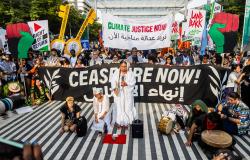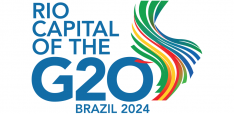Decolonial Education and Youth Aspirations

This post introduces a forthcoming e-book, ‘Decolonial Education and Youth Aspirations’, edited by Nyashadzashe Mandivenga and Sara Camacho Felix. Chapters will be serialised on Global Policy over the coming months.
In the last two decades, we have seen a global rise in social movements opposed to the ideologies and policies of neoliberalism and colonialism led by an increasingly young demographic. Within the last year alone, images and videos of demonstrations and protests have dominated news coverage. These include the voices, faces and banners of the crowds demanding justice.
Who has filled those crowds? Young people. These demonstrations have been filled with students of all ages, from preschool children clutching handmade signs to university students leading chants, their faces lit with purpose and resolve. Globally, youth and students are fighting to decolonise their worlds, and they have started with their educational institutions. University campuses, high school hallways, administration offices, consulates and beyond have been surrounded by youth full of passion and determination, who take on the role of creating a decolonial future as not merely an idea, but an action.
From the chants they sing in unison to the banners they grip, they show they are prepared to fight for justice, no matter the consequences. These protests, ranging from Climate Change to Rhodes Must Fall to Free Palestine to Decolonise The Curriculum, are largely initiated and led by young people seeking to set the agenda for global justice debates in more ‘hard to ignore’ terms, and they force us to recognise youth agency and collective power. These young activists are imagining a post-neoliberal, decolonized society, and are creating their demands around these new social imaginaries.
The foundational assumption of this e-book is that, by recognising youth and students as “future-makers” and paying close attention to these demands, we gain insight into how students across education levels understand, resist, critique, and offer new alternatives to current structures in education and the wider global paradigm. For generations critiqued for being naïve, snowflakes, highly individualistic and preoccupied in their own fantasy worlds within digital devices, these activists' critiques of global power structures demonstrate a sophisticated understanding of socio-political, cultural, and economic realities, as well as the complex histories that precede these realities. Their demands and agency position them as active and knowledgeable members of society with socially just and rebellious imaginations that see a collective decolonial future beyond neoliberalism.
The prominent participation and determination of youth and students in anti-neoliberal protests is particularly admirable since what they are refusing to accept, a neoliberal paradigm and future, is deeply entrenched in their schooling, from primary through to further and higher education. This adds a layer of urgency for us, be we academics, educators or policy practitioners, to act on their demands.
Schooling propels students to an imagined future, viewing them as ‘embodiments of the future’ and a site of social investment. However, this investment is deeply entrenched in political and economic agendas, with education systems largely shaped by neoliberal ideologies and coloniality. These two ideologies are forever interlinked through a history of global empire that both entrenched European knowledge as ‘universal knowledge’, while propelling capitalism as the global order.
At their core, coloniality and neoliberalism in education shape the answers to questions such as: ‘what is education and schooling for, or what purposes does it serve?’; ‘how is it determined?’; ‘how does it change?’; ‘what makes a curriculum relevant?’ and, perhaps most importantly, ‘who does it benefit?’ While modern schooling is often perceived as offering brighter futures for all, the answers to these questions often reflect priorities that perpetuate colonial and neoliberal paradigms, benefiting a global minority while marginalising others.
Current western modes of schooling, informed by these neoliberal paradigms, produce future workers who are servants of capitalism regardless of where in the world they are schooled. In other words, we find that schooling abstracts societal knowledge and aspirations in ways that disconnects learners from local realities. This is a serious problem for youth and students in, and from, the “Global South.” By abstracting societal knowledge and privileging Eurocentric narratives, these systems stifle diverse imaginations.
For youth in the Global South, this perpetuates historical inequalities, while for students in the West, it cultivates a skewed worldview, presenting a false sense of comprehensive understanding while excluding rich, non-Western perspectives. As students increasingly recognise these limitations, disillusionment with global education institutions grows, fuelled by their failure to deliver on promises of a better future and their complicity in reproducing global power hierarchies.
Given that promises of education for a better future are not met, the chapters in this e-book push us to rethink education outside the neoliberal paradigm and delink schooling as a means to fulfill market-driven requirements of capitalism. Decolonial education is an avenue for not only nurturing individual potential but also fostering global social responsibility. By challenging dominant narratives and incorporating marginalised knowledge systems, it empowers students to see themselves as agents of change and enables them to imagine futures tied to their local and cultural realities. Such education encourages critical thinking that is decoupled from neoliberal Eurocentric universality, community-oriented problem-solving, and active participation in envisioning alternative futures. Through this lens, educational environments such as the classroom transform from sites of neoliberal socio-economic reproduction into incubators of revolutionary possibility, equipping young people to co-create a more inclusive and just world.
Current student activism is a call to action in dismantling the effects of neoliberalism, reinforced by education, that transform individuals into isolated consumers who have no choice but to play into capitalist expectations. Their direct challenge to the priorities of their educational institutions and governments, demand that we move away from the necessity of rights ‘to’ education to instead inscribing rights ‘in’ education. Unlike the right to education, which is about access (quantity), rights in education ensures that the basic social, economic, cultural and gendered needs of learners are accounted for (quality).
Rights in education engenders the revitalisation of various global knowledge systems and educational practices that are diminished by colonial and neoliberal hierarchies. It necessitates the imagining of an inclusive education that is responsive to the subjectivities, contexts, and needs of youth across education levels.
As several chapters in this e-book demonstrate, rights in education looks like a decolonial education. A decolonial education looks like multiple things at once. It looks like the intentional process of reimagining education beyond the explicit and implicit legacies of colonial domination. In his book, Out of the Dark Night: Essays on Decolonisation, Achille Mbembe states: ‘Decolonisation, itself, as an act of refusal turned into an act of self-assertion, an act of rebellion turned into an act of refoundation, … was imagined as a kind of relation to the future.’ In the case of education, decolonisation means rejecting the frameworks that make Western knowledge superior, to rebel against the ways it shapes aspirations, norms and expectations.
In other words, decolonial education does not merely react to the limitations imposed by Western dominance; it actively reconstructs the framework of what is possible by reworking and imagining systems in ways that uncover and advance subjugated knowledges through pluralist and collective forms of learning and teaching. It liberates the imagination, allowing learners to envision and work toward futures that are inclusive, diverse, and untethered from the colonial ideologies that have long shaped both the past and present. By integrating diverse global perspectives and histories, decolonial education empowers students to imagine and create alternative futures that prioritise equity, sustainability, and social justice.
By exploring these interconnected themes, this e-book, edited by Nyashadzashe Mandivenga and Dr. Sara Camacho Felix, highlights how decolonial education and the ‘future’ are intimately woven, exploring what they mean for each other. Chapters in this volume explore these ideas across geographies, ages and types of education. Geographically, the work in the chapter represents a wide diversity, including Bangladesh, Brazil, Nigeria and West African more generally, Pakistan, Poland, South Africa, the United Kingdom, and the United States, with some of the work taking a more global lens. Some chapters explore theoretical ideas of what might be possible, be it through the pluriverse, mutual aid, or considering the concept of Ummah. Others present initiatives that actively attempt to enact decoloniality as they build future-oriented education. These chapters explore possibilities, giving hope for enacting decolonial education while maintaining a critical eye on how initiatives are lived and framed. Some look at activist spaces and education, while others take place in formal settings. Regardless of the difference and diversity of the chapters, all try, in one shape or another, to grapple with the dismantling of colonial knowledge while engaging with youth aspirations.
Chapters in Decolonial Education and Youth Aspirations will be serialised over the coming months on Global Policy’s Opinion pages. The first chapter will be by Dr Sara Camacho Felix, where she provides an insightful theory on decolonial imaginations. Find them here.
Nyashadzashe Mandivenga is an International Development researcher with a particular interest in decolonial education, ethical development, and endogenous knowledge production. She has a MSc in Development Management from the London School of Economics & Political Science.
Sara Camacho Felix is a Senior Lecturer of Global Cultures and Liberal Arts Education in the Department of Interdisciplinary Humanities at King’s College, London.
Image: Mídia NINJA CC BY-NC 2.0


